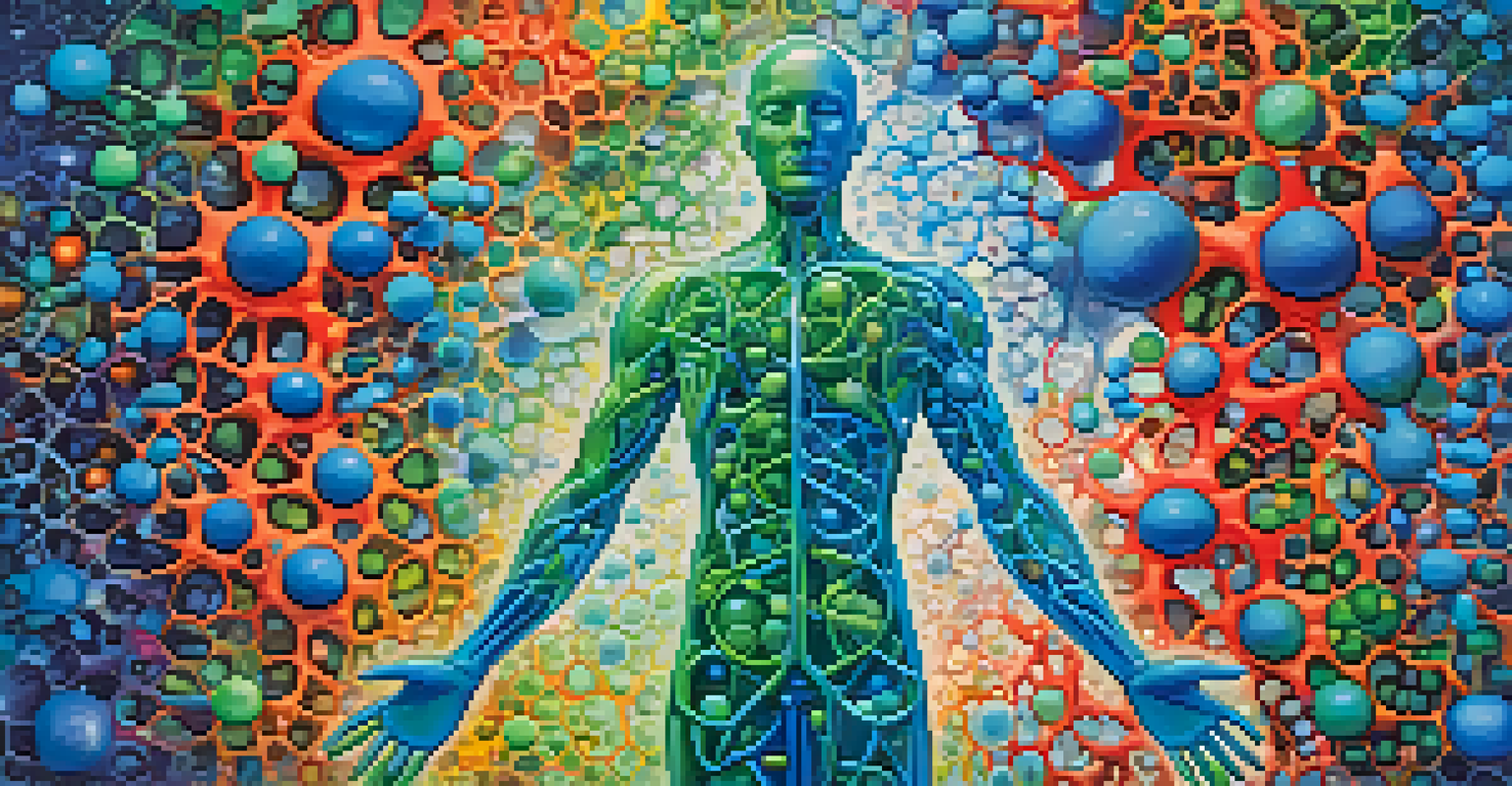The Role of THC in Modulating Drug Metabolism Processes

What is THC and Its Significance in Medicine?
Tetrahydrocannabinol (THC) is the primary psychoactive compound found in cannabis. It has gained attention not only for its recreational use but also for its potential therapeutic benefits. THC interacts with the body’s endocannabinoid system, which plays a crucial role in various physiological processes, including pain relief, mood regulation, and appetite stimulation. Understanding THC's role is essential for grasping its impact on drug metabolism and therapeutic applications.
Cannabis is a complex plant with a complex history, and it is clear that it has the potential to support health in a variety of ways. Understanding its effects on the body is essential for unlocking that potential.
Medical professionals are beginning to recognize THC's potential to modulate other medications' efficacy and safety. For instance, patients using THC for chronic pain management might also be taking other medications, making it vital to understand how these substances interact. This interaction can lead to either increased effects or side effects, which can significantly influence treatment outcomes.
As research continues, THC's significance in medicine evolves, prompting questions about its use in conjunction with other drugs. This raises the need for further exploration into how THC affects drug metabolism, which could lead to more personalized and effective medical treatments.
How THC Affects Drug Metabolism Processes
Drug metabolism is the process by which the body breaks down medications, influencing their effectiveness and duration in the system. THC can alter these metabolic pathways, primarily by interacting with liver enzymes responsible for metabolizing a wide range of drugs. This means that THC can either speed up or slow down how quickly other medications are processed, affecting their therapeutic effects.

For example, THC may inhibit certain cytochrome P450 enzymes, which are crucial for metabolizing various pharmaceuticals. When these enzymes are inhibited, it can lead to increased concentrations of the drugs, potentially causing heightened effects or adverse reactions. This interaction underscores the importance of monitoring patients who use THC alongside other medications, as it can significantly impact safety and efficacy.
THC's Role in Drug Interactions
THC can significantly alter drug metabolism, impacting the efficacy and safety of other medications.
Conversely, THC might also induce certain metabolic pathways, leading to a faster breakdown of some medications. This dual action highlights the complexity of THC's role in drug metabolism and emphasizes the need for healthcare providers to be aware of these interactions when prescribing treatments.
The Therapeutic Implications of THC's Role
Understanding how THC impacts drug metabolism has significant therapeutic implications. For patients using cannabis for chronic conditions like cancer or epilepsy, the interaction between THC and their prescribed medications must be carefully considered. Adjusting dosages or switching medications may be necessary to ensure optimal treatment outcomes while minimizing side effects.
The therapeutic use of cannabis and its compounds must be approached with caution, as the interaction with other medications can be unpredictable and significant.
Furthermore, patients undergoing treatment with THC might experience changes in how their body responds to conventional medications. This may necessitate a reevaluation of their treatment plans, potentially leading to the development of personalized medicine approaches that take into account individual responses to THC and other drugs.
As research progresses, the therapeutic use of THC could expand, potentially leading to new treatment combinations that enhance efficacy while reducing adverse effects. This evolution in understanding could pave the way for more effective management of complex medical conditions.
Potential Risks and Side Effects of THC Interaction
While THC can offer therapeutic benefits, it also carries potential risks when interacting with other medications. Increased drug concentrations due to THC's inhibition of metabolic pathways can lead to unwanted side effects, such as increased sedation or impaired cognitive function. It's essential for patients and healthcare providers to be aware of these risks to manage them effectively.
For instance, a patient taking both THC and a sedative may experience heightened drowsiness, which could impact daily activities like driving or operating machinery. Similarly, certain medications that rely on the same metabolic pathways as THC could become less effective, leading to inadequate treatment for underlying conditions.
Therapeutic Implications of THC
Understanding THC's effects on drug interactions can lead to more personalized and effective treatment plans for patients.
Therefore, it's crucial for individuals considering THC use to discuss their complete medication regimen with healthcare professionals. This open dialogue can help minimize risks and ensure that all medications work harmoniously, enhancing patient safety and treatment efficacy.
The Future of THC Research in Drug Metabolism
As the acceptance of cannabis and THC in medicine grows, so does the need for comprehensive research into their effects on drug metabolism. Future studies are likely to focus on specific drug interactions, helping to clarify how THC influences the metabolism of various pharmaceuticals. This research could lead to the development of guidelines to inform healthcare providers on prescribing practices.
Moreover, exploring the pharmacogenomics of THC could unveil how individual genetic differences impact drug metabolism, allowing for more tailored therapeutic approaches. By understanding how different patients metabolize THC and other drugs, healthcare providers can optimize treatment plans to enhance safety and efficacy.
The future of THC research holds promise not only for patients using cannabis therapeutically but also for the broader medical community. A deeper understanding of these interactions will ultimately empower healthcare professionals to make informed decisions, improving patient care and treatment outcomes.
Integrating THC into Patient Treatment Plans
Successfully incorporating THC into patient treatment plans requires a collaborative approach between patients and healthcare providers. Open communication about all medications, including cannabis, is vital for creating a safe and effective treatment strategy. This discussion should include potential benefits, risks, and how THC may interact with existing medications.
Healthcare providers should take the initiative to educate patients about THC's effects on drug metabolism and encourage them to report any side effects experienced during treatment. This proactive engagement can help identify potential drug interactions early, allowing for timely adjustments to treatment plans.
Risks of THC in Treatment Plans
Patients must be aware of the potential risks and side effects associated with using THC alongside other medications.
Ultimately, a patient-centered approach that considers individual needs and circumstances can lead to more effective use of THC in managing health conditions. By working together, patients and healthcare providers can navigate the complexities of drug interactions and optimize therapeutic outcomes.
Conclusion: Embracing the Complexity of THC and Drug Metabolism
Understanding the role of THC in modulating drug metabolism is a multifaceted endeavor, filled with both opportunities and challenges. As research continues to unfold, it's clear that THC's impact on drug interactions must be taken seriously, particularly for individuals using it for medical purposes. The nuances of these interactions call for an informed approach to treatment.
By embracing the complexities of THC and its effects on drug metabolism, healthcare providers can better support their patients in navigating these challenges. This involves not only recognizing the potential benefits of THC but also being vigilant about the possible risks associated with its use alongside other medications.

As we move forward, fostering a culture of open dialogue between patients and healthcare professionals will be essential. Together, we can harness the therapeutic potential of THC while safeguarding patient health and well-being.